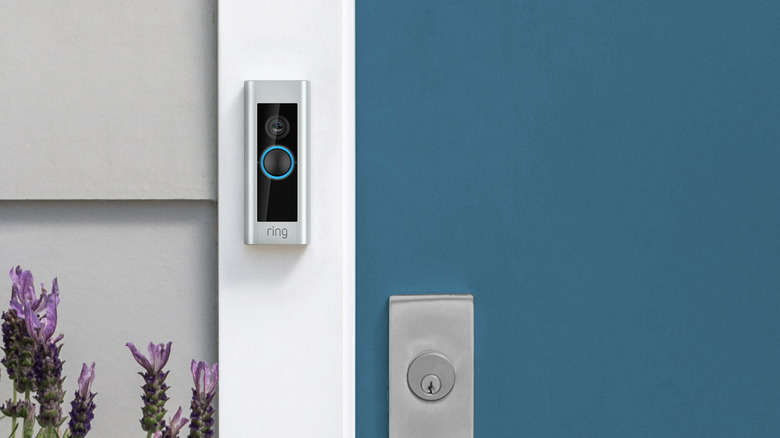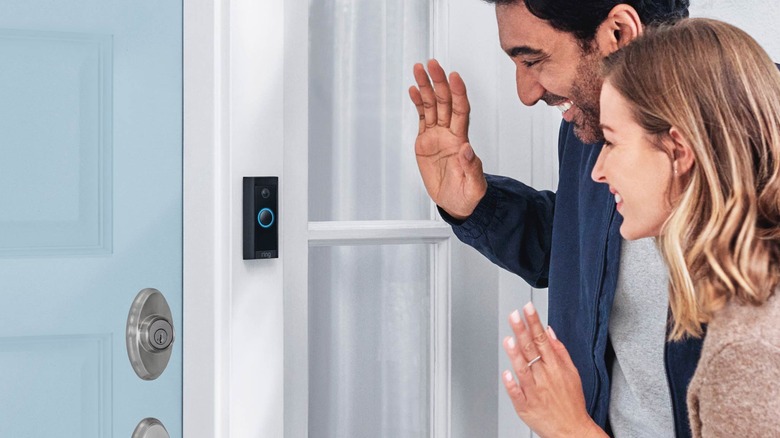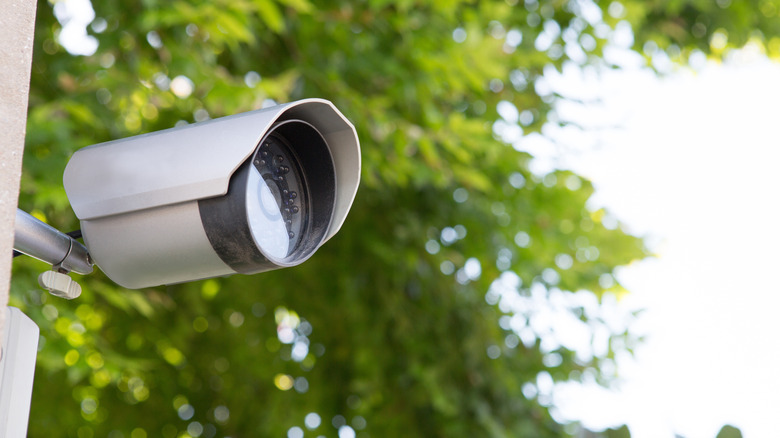Two Ways Thieves Can Disable Your Ring Camera (And How To Prevent It)
Ring cameras, and other video doorbells, are an increasingly common security feature. They give peace of mind in some ways. Firstly they'll record anyone who gets within a certain distance of the door. This is handy if a crime is about to take place on your doorstep or in the local area. Footage from doorbell cameras is often requested by police when they're attempting to identify a suspect.
Then, there is the alert system that many doorbells use. If it detects someone in front of your property, a notification will pop up on linked phones, tablets, or any other device set up with the account. This is useful for a few reasons, firstly vulnerable people can avoid answering the door to anyone potentially dangerous. They can instead call the police while retreating to a safe position within the house. With some cameras, including those made by Ring, you can speak through the doorbell. You can tell the person you're answering the door, or potentially scare off an unwelcome guest.
Camera owners can also quickly see when something has been delivered, like food or a package. This allows them to quickly retrieve the item, reducing the odds it will be snatched by "porch pirates." Even if they can't, any porch pirate on the prowl will be caught on camera when they go to loot their booty. At least they will in theory, but cameras can be bypassed. Here's how, and how you can defend against that.
Signal jammers are a common tactic
Most of the time, Ring cameras rely on Wi-Fi to establish a connection with your home. Unfortunately, Wi-Fi is incredibly vulnerable to jamming attacks. The sale, purchase, and production of jamming equipment is illegal in the United States, but that doesn't stop criminals from getting hold of said equipment. Making it isn't that complex, and even high school teachers have gotten their hands on jamming devices.
Jamming usually works by flooding a particular frequency with radio noise and overwhelming the devices in a specific area. As ring cameras operate on the 2.4 GHz Wi-Fi band, it doesn't take a genius to work out what frequency range needs to be flooded to cut various devices off from the network. A Ring Camera that is hit with a jammer won't be damaged, and there's a chance you'll never know the jamming even happened. It will just be disconnected from the network for as long as the jamming is active.
This means no alerts, no live feed, and no footage being stored if you back that footage up on a dedicated server. It can give criminals to do their thing and get away before you know what's going on. It will also affect every device that relies on your Wi-Fi network, so any other Wi-Fi-reliant security devices in the vicinity will be out too. Fortunately, while jamming may seem like James Bond-level stuff, it's not that hard to guard against.
How to protect against signal jamming
You can protect against signal jamming in a number of ways. The simplest method is to just not rely on your Wi-Fi network. If your Ring camera is hardwired, then jamming won't interfere with it. It will also have a continuous supply of power, increasing its reliability. This is the best and safest way to defend against jamming attacks.
While not an ideal solution, local storage is also a good guard against jamming. Your camera won't be disabled, it will just be disconnected from your network. So if it has an SD card or other local method of storing its recordings, you will at least be able to see what's happened after the fact and may even get a good look at the thief. This can be countered if the thief simply takes the SD card with them, but in the heat of the moment, disassembling part of your ring camera may slip their mind.
Devices that detect network outages, such as those made by Fing, are also a handy defense. While it won't directly counter the signal blocker, it will alert you to the fact your network connection has been interrupted. This isn't as ideal as an alert from Ring, as you won't immediately be able to open the camera feed and see what's going on, but it will still serve as an immediate indicator that something is potentially wrong.
Brute force can be done from a distance
A great way to disable something is to destroy it. However, if a miscreant runs up to a Ring camera before smashing it with a hammer, or applying a coat of spray paint to the lens, then the chances are they will have been captured on film just before the act. The camera will also have alerted its owner to the movement it witnessed. All of this somewhat defeats the purpose of the attack.
However, there is another method that is very difficult to defend against. Despite their varying legality, high-power laser pointers are relatively cheap and widely available. Just as you shouldn't shine one into your eyeball, lest you risk permanent blindness, shining one into a Ring camera you don't want to destroy isn't a great idea either.
The camera consists of a lens with some sensing equipment behind it. The laser beam is already powerful, and the lens will essentially act like a magnifying glass amplifying that power. So, just like an ant in the presence of a sociopathic child in summer, that sensing equipment is likely to be permanently fried if a laser pointer hits the camera correctly. This can be done from a significant distance, far beyond the camera's effective range. Alternatively, other light sources can be used at close range to overwhelm the sensor and obscure the camera's view. Alerts will still go out, as the proximity sensor is a bit harder to disable. But you're unlikely to see anything on the footage and your device may be toast afterward.
There are still things you can do
The most effective way of defending against this sort of attack may also reduce the effectiveness of your ring camera: you need to place it somewhere obscure where there isn't a lot of straight line distance between it and everything else. If you can see the lens from across the street, it's vulnerable. This does impact the camera's field of view and means it's less likely to catch someone off to do misdeeds to one of your neighbors, but it will stop someone taking it out from range and may prevent them spotting it up close before it's too late.
The only other alternative is to install a second camera facing your door. That way, when a bad actor is dealing with, or thinks they've dealt with, the main camera the backup has a good chance of catching what they look like. It's not ideal, but it's more reliable than hoping one of your neighbors' devices gets a clear view of whoever is hitting your house.
Finally, as mentioned, proximity sensors attached to the device should still work during and after this kind of attack. So check your feed if you spot one, and alert the authorities if all you see is flickering bright light. The potential intruder is going to a lot of effort with this kind of attack, especially if your camera is somewhere less than obvious, so it's unlikely they have good intentions in mind.




